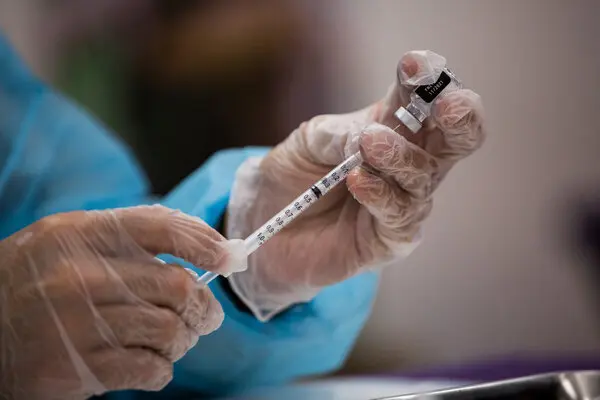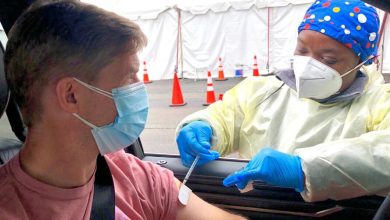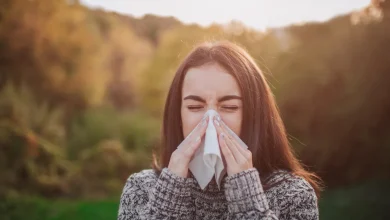Vaccines Significantly Reduce the Risk of Long Covid, Study Finds
In the first two years of the pandemic, the rate of long Covid was starkly lower among people who were vaccinated, researchers reported.

Some of the greatest proof that vaccinations lower the likelihood of getting long-term COVID-19 illness has been found in a sizable new study.
Examining individuals infected in the United States during the first two years of the epidemic, scientists discovered that the proportion of vaccinated individuals who experienced long-term Covid was significantly lower than that of unvaccinated individuals.
As patients with severe illnesses are more likely to experience long-term symptoms, medical experts have previously stated that vaccinations can reduce the chance of long-term Covid. This is mostly because they help avoid severe disease during the infection phase.
However, a lot of people who have minor infections also end up with lengthy Covid. The study, which was published on Wednesday in The New England Journal of Medicine, discovered that getting vaccinated did not completely remove the chance of getting the illness, which still affects millions of people in the US.
with an accompanying editorial, Dr. Clifford Rosen, a senior scientist at the MaineHealth Institute for Research who was not part with the study, stated that “there was a residual risk of long Covid among vaccinated persons.” Dr. Rosen continued, “New cases of long Covid may continue unabated” as a result.
Millions of patients’ medical records from the Department of Veterans Affairs health system were examined for this investigation. It involved around 4.7 million persons who were not infected and approximately 450,000 people who contracted Covid between March 1, 2020, and January 31, 2022.
The study population of veterans had a far lower diversity than the whole American population. The participants’ average age was 64, about three-fourths were white, and roughly 91% of them were men.
To determine the proportion of Covid patients who had long Covid one year after infection, the researchers examined the medical data. Those who received vaccinations and contracted the virus between mid-December 2021 and January 2022 had the lowest rate of long-term Covid infection in the trial, at 3.5 percent.
In contrast, the study’s unvaccinated individuals who contracted the infection during the same time period had a rate of 7.8%.
Lead author of the study Dr. Ziyad Al-Aly, a clinical epidemiologist at Washington University in St. Louis and chief of research and development at the V.A. St. Louis Health Care System, stated, “We found that much of the decline is attributable to vaccination.”
However, he claimed that “people are not keeping up with yearly vaccine shots, and vaccine effectiveness wanes considerably with time.”
“We cannot have our cake and eat it, too,” he continued. We cannot claim that vaccinations had prevented Covid for so long before giving up on immunization. This will lead to an increase in cases once more.
According to Dr. Al-Aly, the researchers took into account comparisons between uninfected individuals who experienced comparable symptoms in order to rule out other potential reasons.
Major long-term Covid symptoms, such as brain fog and fatigue, can also affect patients with cancer and other conditions, so the authors calculated the percentage attributable to long-term Covid by subtracting the rate of those symptoms in the uninfected population from the rate in the infected population, he said.
The study encompassed the period from the coronavirus’s first appearance until the introduction of two highly infectious forms, Delta and Omicron, following the introduction of vaccinations. The authors did not compute a rate for the combined group of vaccinated and unvaccinated patients, but they did compare outcomes between the two groups.
Researchers discovered that the rate of long-term Covid fell to 9.5 percent a year later from 10.4 percent among those infected during the first 15 months of the pandemic among unvaccinated individuals infected between June 19 and Dec. 18, 2021, when Delta was the predominant strain.
Among unvaccinated individuals infected during the Omicron wave between December 19, 2021 and January 31, 2022, the rate dropped even further to 7.8 percent.
Infected individuals who had received vaccinations had much reduced incidence of long-term Covid. The scientists acknowledged that variations and other features of the Delta and Omicron periods contributed, but they estimated that vaccinations were responsible for roughly 72% of the decline.
A year later, 3.5 percent of those infected during the Omicron period and 5.3% of those infected during the Delta era had lengthy Covid.
Dr. Al-Aly stated, “This is lower than earlier phases, but it is not low.” “3.5 percent per 100 adult infections will translate into millions of additional cases of long-term Covid when multiplied by the enormous number of people who continue to get infected and reinfected.”
Although the researchers did not examine later time periods, a recent survey conducted by the Centers for Disease Control and Prevention found that 13.7 million adults in the US, or roughly 5.3% of the adult population, currently have long-term COVID-19.
According to the authors, during the first two years of the pandemic, long-term Covid symptoms in most categories, such as kidney and cardiovascular issues, decreased. However, during the Omicron era, unvaccinated individuals experienced an increase in gastrointestinal, metabolic, and musculoskeletal issues, which is likely due to changes in the virus and other factors.




